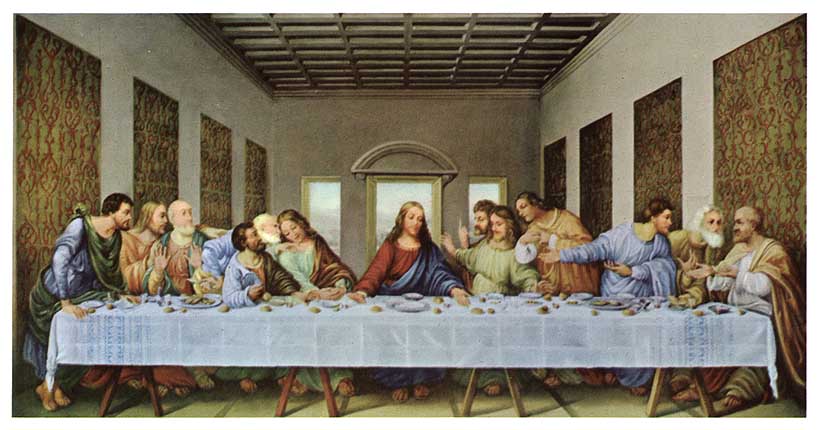Lesson Seven (Chapter 26)
Blood and Redemption
“And I have also heard the
groaning of the children of Israel whom the Egyptians keep in bondage, and I
have remembered My covenant.
Therefore say to the children of Israel: ‘I am HaShem;
I will bring you out from under the burdens of the Egyptians,
I will rescue you from their bondage, and
I will redeem you with an outstretched arm and with
great judgments.
I will take you as My people, and I will be your G-d.
Then you shall know that I am Ad-nai your G-d who brings you out from
under the burdens of the Egyptians.”
Exodus 6:5-7
"You know that after two days is the Passover, and the Son of Man will be delivered up to be crucified.”Matthew 26:2
Introduction
- Last week we focused on the “preparation parables” of chapters 24 and 25. We saw that Yeshua always warns His talmidim. The singular point of these parables is simply: get ready. The time is fixed, but you do not know it.
- Always repent the day before your last day… Now is the time.
- The stage is now set… it was now time to see How G-d “with an outstretched arm” would redeem His people once and for all. That phrase takes us back to the Exodus story and the four “I wills” of Passover (Ex 6:6-7).
“Last Supper”, “L-rd’s Supper”, or “Last Seder”
- Matt 26:2; 17-29: The talmidim did not need instructions. The reason they were in Jerusalem as well was not a mystery (Chag Regalim). This is where classical “Christianity” has had its most difficult time stripping the Jewishness from the Gospels. But it does not mean they did not try…
- Can you find the things wrong with this picture? Maybe a better, would be, is there anything correct?

Chag Regalim
- Deut 16:1-17: The three pilgrimage feasts were commanded not only for a set time based upon a lunar-solar calendar, but for a set PLACE. That place is the “place” [makom] where He places [sh’kan] His Name [Shem].
- G-d promised David that He would place His Name in Jerusalem – a royal city for His throne (1Kings 11:34-36)
- 1Kings 8:27-29; 9:1-3: The promise was fulfilled during Solomon’s reign. G-d’s eternal sh’kan is there… and there alone.
- Every Passover (Unleavened Bread), Shavuot, and Sukkot all Israelite males, if they are able are to go to Jerusalem to the “Temple” [bet = house; heikhal = palace; a place to hold SOMETHING/SOMEONE , mik’dosh = Holy place].
- Lev 23: Mo’edim [Feasts] of Ad-nai. Repeated phrase: a statute forever… So would the perfect Lamb, Messiah, keep the Mo’edim? Would He command His talmidim to do the same? Can you list them?
Pesach/Passover and Unleavened Bread
- Ex 6:6-7: The “Four ‘I Wills’”:
- “I am HaShemi”…
- I will bring you out from under burdens
- I will rescue you bondage
- I will redeem you with an outstretched arm and with great judgments
- I will be your G-d
- Then you shall know that I am Ad-nai Eloheynu
- Ex 12:1-36: Passover is the ultimate redemption – past and present. All the other “Feasts” of Lev 23 are for a people who have been redeemed by what occurs in the Passover.
- How long is this command in effect? (vs 14)
- Why is it still in effect? What is the point? Lev 17:11: A memorial of atonement.
- Unleavened Bread: 7 days beginning with the Passover night.
- Unleavened Bread shows putting faith into action (true faith) – not putting leaven into the bread BEFORE deliverance requires believing G-d’s statements.
- 1Cor 5:7-8: The Pesach Lamb is the source of blood and flesh – the instrument of G-d’s deliverance. The lambs of old, were pictures of Messiah, our perfect Pesach Lamb.
The Wine and a Vow
- Matt 26:28-29: This is the last usage of the word “Kingdom” in Matthew. This is one of two reference to the “New Covenant” [re: (kainos diatheke)] in the Apostolic Scriptures. From Jer 31:31 (38:31 LXX)
- This is not the institution of a new ritual – it an explanation of the ancient one from Ex 12 and Lev 23 (i.e. Passover).
- Yeshua vows to not drink any more of the fruit of the vine “until that day when I drink it new with you in My Father’s Kingdom.” This constitutes the voluntary Nazerite vow. Passover is the traditional time to do this – but the end is usually Shavuot.
- Num 6:1-8; Acts 18:18; Num 21:26. The Temple must stand for a Nazerite vow to be able to end, because as we see in Torah and Paul’s experience, a sacrifice is required to seal the end.
- A Nazerite vow often proceeded the consecrating of oneself for a specific task. When we drink now we should remember His consecrating vow.
Summary
- Passover was always about redemption. It was a physical and a spiritual redemption – but it also pointed to the ultimate Passover, and the ultimate Pesach – our Messiah.
- If we follow Yeshua the Messiah, we have been redeemed by His outstretched arm and we have been made free… so that we may feast with Him!
“Thus says
HaShem G-d of Israel: ‘Let My people go, that they may hold a feast to Me in
the wilderness.’”
Exodus 5:1b